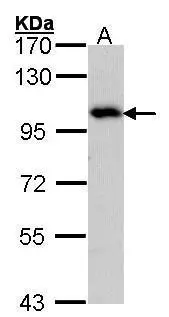
Sample (30 μg of whole cell lysate) A: HepG2 (GTX27900) 7.5% SDS PAGE GTX101599 diluted at 1:1000 The HRP-conjugated anti-rabbit IgG antibody (GTX213110-01) was used to detect the primary antibody.
ADAM15 antibody [N1N2], N-term
GTX101599
ApplicationsWestern Blot, ImmunoHistoChemistry, ImmunoHistoChemistry Paraffin
Product group Antibodies
ReactivityHuman, Mouse, Rat
TargetADAM15
Overview
- SupplierGeneTex
- Product NameADAM15 antibody [N1N2], N-term
- Delivery Days Customer9
- Application Supplier NoteWB: 1:500-1:3000. IHC-P: 1:100-1:1000. *Optimal dilutions/concentrations should be determined by the researcher.Not tested in other applications.
- ApplicationsWestern Blot, ImmunoHistoChemistry, ImmunoHistoChemistry Paraffin
- CertificationResearch Use Only
- ClonalityPolyclonal
- Concentration0.35 mg/ml
- ConjugateUnconjugated
- Gene ID8751
- Target nameADAM15
- Target descriptionADAM metallopeptidase domain 15
- Target synonymsMDC15, disintegrin and metalloproteinase domain-containing protein 15, MDC-15, a disintegrin and metalloproteinase domain 15 (metargidin), metalloprotease RGD disintegrin protein, metalloproteinase-like, disintegrin-like, and cysteine-rich protein 15
- HostRabbit
- IsotypeIgG
- Protein IDQ13444
- Protein NameDisintegrin and metalloproteinase domain-containing protein 15
- Scientific DescriptionThe protein encoded by this gene is a member of the ADAM (a disintegrin and metalloproteinase) protein family. ADAM family members are type I transmembrane glycoproteins known to be involved in cell adhesion and proteolytic ectodomain processing of cytokines and adhesion molecules. This protein contains multiple functional domains including a zinc-binding metalloprotease domain, a disintegrin-like domain, as well as a EGF-like domain. Through its disintegrin-like domain, this protein specifically interacts with the integrin beta chain, beta 3. It also interacts with Src family protein-tyrosine kinases in a phosphorylation-dependent manner, suggesting that this protein may function in cell-cell adhesion as well as in cellular signaling. Multiple alternatively spliced transcript variants encoding distinct isoforms have been observed. [provided by RefSeq]
- ReactivityHuman, Mouse, Rat
- Storage Instruction-20°C or -80°C,2°C to 8°C
- UNSPSC12352203
References
- Chung YL, Pan CH, Wang CC, et al. Methyl Protodioscin, a Steroidal Saponin, Inhibits Neointima Formation in Vitro and in Vivo. J Nat Prod. 2016,79(6):1635-44. doi: 10.1021/acs.jnatprod.6b00217Read this paper

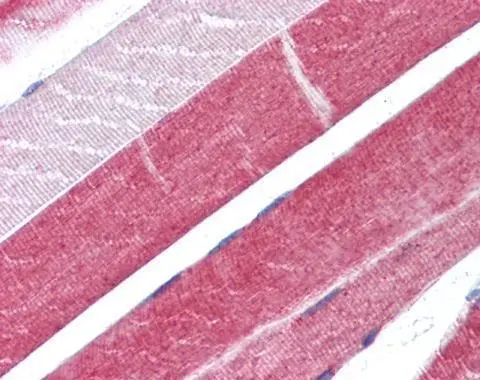
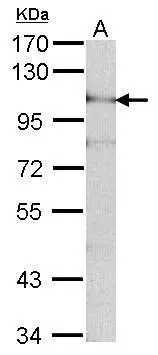
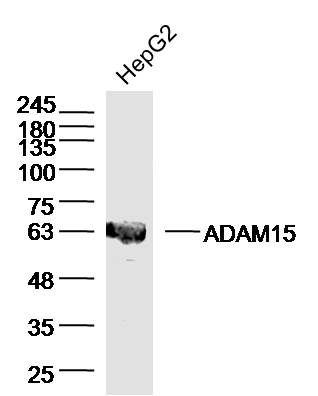

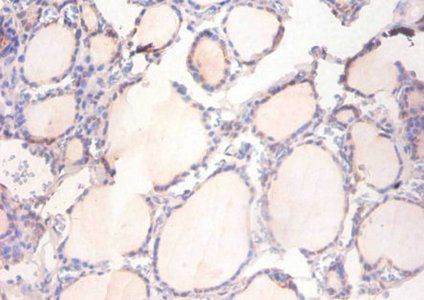
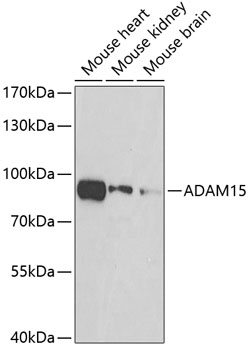


![WB analysis of HEK293 cells overexpressing human ADAM15 using GTX52529 ADAM15 antibody [9H34].](https://www.genetex.com/upload/website/prouct_img/normal/GTX52529/GTX52529_20191119_WB_w_23060900_157.webp)